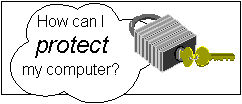
|
Protecting a Computer from Viruses
|
[Anti-Virus Page]
[Help Center]
How can I keep my computer free from viruses?
A common component of anti-virus software is a "resident" program
that checks files and disks for virus infections before letting
you use them.
(A "resident" program runs when you start your computer, and it
continues to run "behind the scenes" while you use the computer.)
If it finds something that seems to be infected, it will warn
you and probably will not let you continue whatever you were
doing until you fix the problem.
You may need to run a separate program to remove the virus from
the infected file(s) or disk(s).
Is a resident program all I need for virus protection?
Some vendors' resident programs are less powerful than their
program for performing a full scan for viruses.
This is usually done to keep the resident program from slowing
your computer's performance.
Also, there are ways a virus can get past a resident anti-virus
program.
For instance, if you start a computer running MS-DOS or Windows
from an infected diskette, the virus will spread to your hard disk.
For the above reasons, you should not rely solely on a resident
program to protect your computer from viruses, but you should
use a scanning program on a regular basis to check for viruses.
If you (or others who use your computer) frequently get files and
diskettes from others, you may want to scan daily or weekly.
If you never share files or diskettes with others, you may only
need to scan every few months.
[Top]
[Anti-Virus Page]
[Help Center]
Last modified: November 25, 1997
This page maintained by
Beth Miller.
Copyright © University of Delaware 1997.

